★★★
“Hollow, I must be going…”
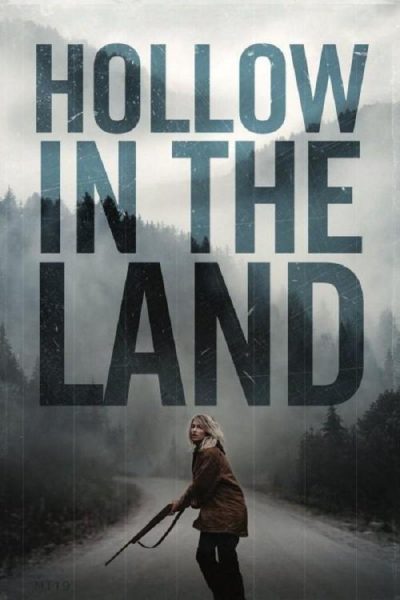 This feels like a Canadian version of Winter’s Bone; not that there’s anything necessarily wrong with this, it just results in a slight sense of deja vu. The Miller siblings are already pariahs in their small town. Their mother walked out on them, and father went to jail for a car accident which killed the son of the local sheriff. Brandon has become a teenage delinquent, whom his sister Alison (Agron) is trying to keep from going off the rails entirely. And she’s a lesbian, so isn’t exactly popular either. After the father of Brandon’s girlfriend turns up dead, he vanishes, becoming suspect #1. Alison can’t believe he’s that bad, so goes looking for him. In the process, helped by a sympathetic deputy (Ashmore), she begins to uncover a lot of unpleasant secrets – things the town would much prefer stayed buried.
This feels like a Canadian version of Winter’s Bone; not that there’s anything necessarily wrong with this, it just results in a slight sense of deja vu. The Miller siblings are already pariahs in their small town. Their mother walked out on them, and father went to jail for a car accident which killed the son of the local sheriff. Brandon has become a teenage delinquent, whom his sister Alison (Agron) is trying to keep from going off the rails entirely. And she’s a lesbian, so isn’t exactly popular either. After the father of Brandon’s girlfriend turns up dead, he vanishes, becoming suspect #1. Alison can’t believe he’s that bad, so goes looking for him. In the process, helped by a sympathetic deputy (Ashmore), she begins to uncover a lot of unpleasant secrets – things the town would much prefer stayed buried.
For the majority of this, it likely fell short of qualifying for the site. Alison has an undeniable persistence, certainly, and her unwavering loyalty to her brother is also laudable. However, the closer she gets to the truth, the greater the importance of physical action becomes. The likely turning point comes when she is out in the woods, and comes across the body of someone who has been shot. The shooter is still nearby, and has Alison in his sights. Thereafter, following an amusing encounter with a pair of female marijuana growers, it becomes clear that talk is no longer getting it done, and it’s time for her to take action. Anyone who says, “Violence isn’t a solution” won’t be happy with the results. But that’s why the film is getting reviewed here!
It’s a very good performance from Agron, who takes a spiky character and makes her easy to like and root for. Alison is someone to whom life has not dealt an easy hand, yet she still persists in trying to do the right thing, in particular towards Brandon. It would certainly be easier, and perhaps even justifiable, for her just to throw up her hands and walk away, leaving him to the consequences of his actions. That unrelenting sense of family is the reason I applied the “mother” tag to this one, even though she’s his sister.
My main issues are likely to do with the plot, which seems to have a number of weaknesses. The biggest one is the identity of the actual murderer. Their motivation fell some way short of feeling compelling, and as a result, their actions seemed more contrived, than flowing naturally out of their situation. There’s also a certain repetitive approach, especially in the front two-thirds, up until the woods incident mentioned above. Seeing Alison approach other residents, and get told to go away, in less polite terms, does get a bit old. And, for Canada, there seem to be a lot of guns around… However, Agron’s performance is enough to hold together this slice of small-town noir, and makes it worth sticking around for the (likely inevitable) bloody finale.
Dir: Scooter Corkle
Star: Dianna Agron, Shawn Ashmore, Rachelle Lefevre, Michael Rogers





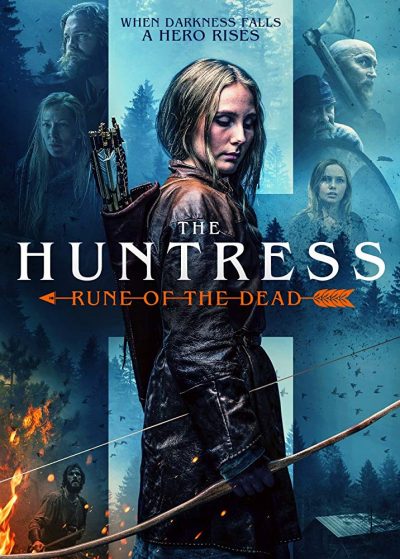 In 9th-century Scandinavia, teenage girl Runa (Stefansdotter) lives deep in the woods, with her mother, Magnhild (Idah), blind grandfather Ragnvald (Beck) and younger sister Bothild (Lyngbrant). Father Joar is notable by his absence, having gone off on a Viking raid to seek fortune for the family, and is now well overdue. However, he did at least train Runa to be a markswoman with the bow. Problems start when she finds a wounded warrior, Torulf, lying in the forest, and brings him back to their cabin, much against Magnhild’s wishes.
In 9th-century Scandinavia, teenage girl Runa (Stefansdotter) lives deep in the woods, with her mother, Magnhild (Idah), blind grandfather Ragnvald (Beck) and younger sister Bothild (Lyngbrant). Father Joar is notable by his absence, having gone off on a Viking raid to seek fortune for the family, and is now well overdue. However, he did at least train Runa to be a markswoman with the bow. Problems start when she finds a wounded warrior, Torulf, lying in the forest, and brings him back to their cabin, much against Magnhild’s wishes.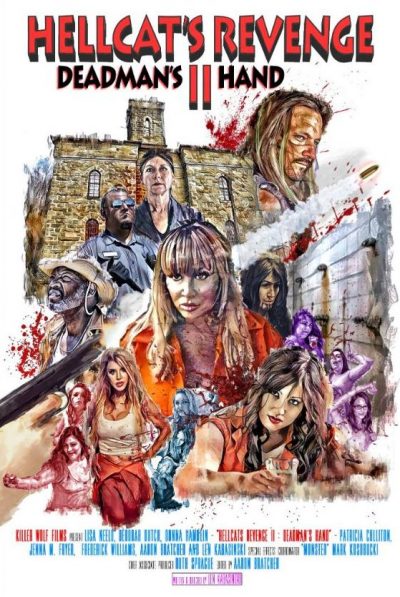 We reviewed
We reviewed 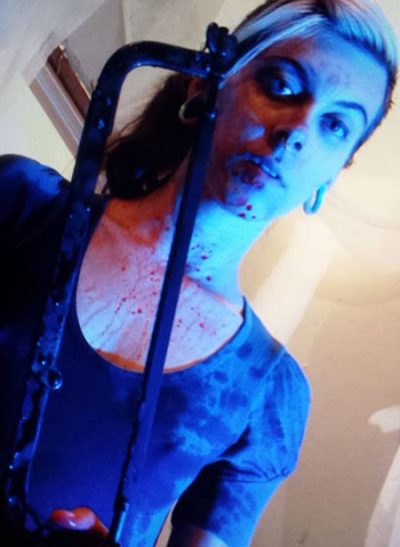 There are times when I feel I need a ★¾ rating. Two stars here would suggest a degree of genuine competence, which this undeniably lacks. But on the other hand, ★½ suggests something which is largely unmemorable, and that isn’t the case either. You won’t forget this. In particular, you won’t forget the scene where the heroine yanks some (suspiciously sausagey) intestines out of a victim, rubs them over her face and then – there’s no other way to describe this – masturbates the intestines. That’s three words I never thought I would write in a row. On that basis (and that basis alone), I’ll err on the side of generous.
There are times when I feel I need a ★¾ rating. Two stars here would suggest a degree of genuine competence, which this undeniably lacks. But on the other hand, ★½ suggests something which is largely unmemorable, and that isn’t the case either. You won’t forget this. In particular, you won’t forget the scene where the heroine yanks some (suspiciously sausagey) intestines out of a victim, rubs them over her face and then – there’s no other way to describe this – masturbates the intestines. That’s three words I never thought I would write in a row. On that basis (and that basis alone), I’ll err on the side of generous.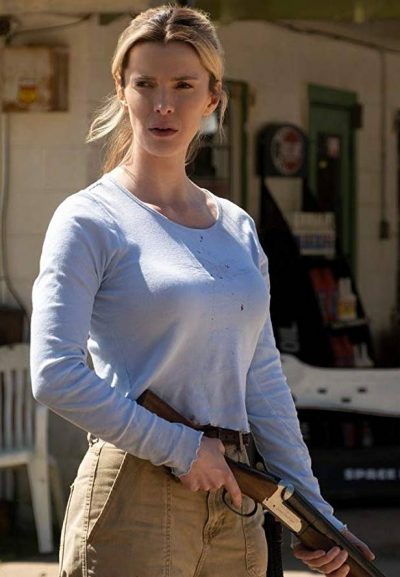
 This was a genuine and pleasant surprise. The original release was pushed back due to some severe controversy: not many films get Tweeted about by the President of the United States, who stated this was “made in order to inflame and cause chaos.” Needless to say, the studio ended up riding that publicity when the movie eventually came out. The current pandemic ended up trumping that (pun intended), so the film hit the home markets, just a week after its theatrical release. To my surprise, it’s considerably more nuanced than the “Red State vs. Blue State” concept I expected. And Gilpin has clearly put her GLOW training to good use, becoming quite the thirty-something bad-ass here.
This was a genuine and pleasant surprise. The original release was pushed back due to some severe controversy: not many films get Tweeted about by the President of the United States, who stated this was “made in order to inflame and cause chaos.” Needless to say, the studio ended up riding that publicity when the movie eventually came out. The current pandemic ended up trumping that (pun intended), so the film hit the home markets, just a week after its theatrical release. To my surprise, it’s considerably more nuanced than the “Red State vs. Blue State” concept I expected. And Gilpin has clearly put her GLOW training to good use, becoming quite the thirty-something bad-ass here. This may be a first, in that the heroine here is non-human – contrary to what you (and, indeed, I!) might expect from the cover. I think I may have covered various crypto-humans before, such as vampires or elves. But this is likely the first entirely alien species. I began to suspect on page 1, when I read that Sah Lee “sank her pin-sharp teeth through the thick fur of the calf’s throat, and tasted the sweet metallic tang of its young blood.” This is clearly not your average twelve-year-old. And so it proves. The story really kicks under way two years later, when Sah Lee leaves her rural village on the planet of Aarn to attend school in the city of Aa Ellet.
This may be a first, in that the heroine here is non-human – contrary to what you (and, indeed, I!) might expect from the cover. I think I may have covered various crypto-humans before, such as vampires or elves. But this is likely the first entirely alien species. I began to suspect on page 1, when I read that Sah Lee “sank her pin-sharp teeth through the thick fur of the calf’s throat, and tasted the sweet metallic tang of its young blood.” This is clearly not your average twelve-year-old. And so it proves. The story really kicks under way two years later, when Sah Lee leaves her rural village on the planet of Aarn to attend school in the city of Aa Ellet. Architect Beth Davis (Bell) is just about to leave Chicago for a business meeting in Miami, when she hears there has been an explosion at the high-rise apartment building downtown, where she lives with husband Jack (Davis) and son Charlie (Arnold). Rushing back home, she finds the situation increasingly perilous, and the fire department unwilling to enter the unstable structure. Having been the person who designed the building, Beth is able to sneak in, with the aid of a sympathetic fireman, Ray Steele (Holmes, looking like a low-rent Tony Todd) on the outside, and begin the perilous climb to the 55th floor where Jack and Charlie are trapped in the bathroom.
Architect Beth Davis (Bell) is just about to leave Chicago for a business meeting in Miami, when she hears there has been an explosion at the high-rise apartment building downtown, where she lives with husband Jack (Davis) and son Charlie (Arnold). Rushing back home, she finds the situation increasingly perilous, and the fire department unwilling to enter the unstable structure. Having been the person who designed the building, Beth is able to sneak in, with the aid of a sympathetic fireman, Ray Steele (Holmes, looking like a low-rent Tony Todd) on the outside, and begin the perilous climb to the 55th floor where Jack and Charlie are trapped in the bathroom.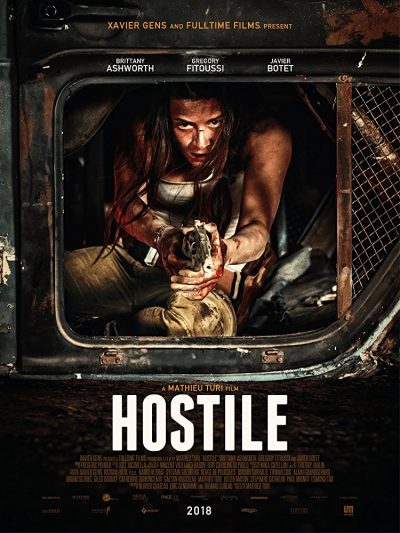 After an un-specified global apocalypse, humanity is reduced to small bands of scattered survivors, who have to try and scratch out survival, while avoiding the attacks of “reapers”, mutated creatures which stalk the landscape, especially after dark. One of those survivors is Juliette (Ashworth), who is on a foraging mission in the desert when an accident throws her off the road, and leaves her with a badly-broken leg. She has to wait for help to arrive, fending off the reaper (Botet) which is prowling the area, with whatever she can find to hand. As she does so, she thinks about life before the apocalypse, where she escaped drug addiction with the help of her boyfriend, gallery owner Jack (Fitoussi) – only for happiness to be fleeting, and taken away from her when multiple tragedies strike.
After an un-specified global apocalypse, humanity is reduced to small bands of scattered survivors, who have to try and scratch out survival, while avoiding the attacks of “reapers”, mutated creatures which stalk the landscape, especially after dark. One of those survivors is Juliette (Ashworth), who is on a foraging mission in the desert when an accident throws her off the road, and leaves her with a badly-broken leg. She has to wait for help to arrive, fending off the reaper (Botet) which is prowling the area, with whatever she can find to hand. As she does so, she thinks about life before the apocalypse, where she escaped drug addiction with the help of her boyfriend, gallery owner Jack (Fitoussi) – only for happiness to be fleeting, and taken away from her when multiple tragedies strike.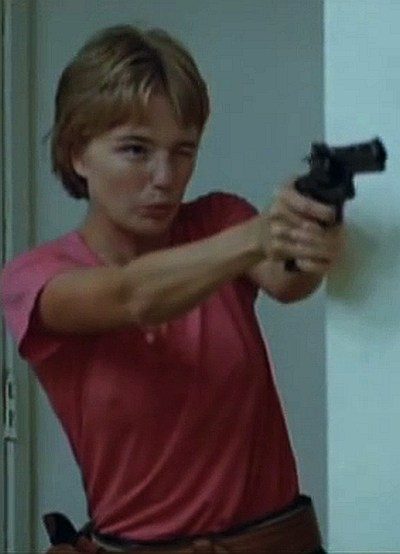 Either by intent or accidentally – and we’ll get to that in a moment – this manages to be both an indictment of and an advert for, American gun culture. That’s quite a spectacular achievement, and it’s perhaps no coincidence that the writer/director is British, so brings an outsider’s balanced eye to a topic that’s often acrimonious in the States. Kathleen Sullivan (Young) is a teacher who has just moved from Boston to a small Texas town. She falls for local attorney Larry Keeler (Day), though is only interested in friendship, not a significant relationship. The initially-charming Larry eventually won’t take no for an answer, and date-rapes Kathleen. However, the circumstances and her attacker’s local reputation mean she gets no satisfaction from the police. The meek and mild Kathleen decides to take matters into her own hands, buying a gun and taking up combat shooting – at the very same club Larry frequents – with the aim of meting out her own brand of justice.
Either by intent or accidentally – and we’ll get to that in a moment – this manages to be both an indictment of and an advert for, American gun culture. That’s quite a spectacular achievement, and it’s perhaps no coincidence that the writer/director is British, so brings an outsider’s balanced eye to a topic that’s often acrimonious in the States. Kathleen Sullivan (Young) is a teacher who has just moved from Boston to a small Texas town. She falls for local attorney Larry Keeler (Day), though is only interested in friendship, not a significant relationship. The initially-charming Larry eventually won’t take no for an answer, and date-rapes Kathleen. However, the circumstances and her attacker’s local reputation mean she gets no satisfaction from the police. The meek and mild Kathleen decides to take matters into her own hands, buying a gun and taking up combat shooting – at the very same club Larry frequents – with the aim of meting out her own brand of justice. I was quite surprised to hear about Amazon taking up Joe Wright’s 2011
I was quite surprised to hear about Amazon taking up Joe Wright’s 2011